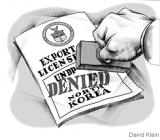 An editorial in Friday’s Wall Street Journal was critical of the United Nations Development Program (“UNDP”) for several supposedly illegal exports. The criticism seems to be largely based on the questionable claim that the UNDP was required to obtain export licenses from the Bureau of Industry and Security for certain items exported by UNDP from foreign countries to North Korea, including a spectrometer, some GPS equipment and some computer equipment. Sadly, the author of the editorial, Melanie Kirkpatrick, doesn’t appear to have consulted with anyone who actually knows anything about export law.
An editorial in Friday’s Wall Street Journal was critical of the United Nations Development Program (“UNDP”) for several supposedly illegal exports. The criticism seems to be largely based on the questionable claim that the UNDP was required to obtain export licenses from the Bureau of Industry and Security for certain items exported by UNDP from foreign countries to North Korea, including a spectrometer, some GPS equipment and some computer equipment. Sadly, the author of the editorial, Melanie Kirkpatrick, doesn’t appear to have consulted with anyone who actually knows anything about export law.
Ms. Kirkpatrick premises her analysis on a export license application by UNDP for GPS mapping software which was denied on September 16, 1999. She notes that the software was EAR99. Astute readers will recall that up until September 17, 1999, U.S. sanctions prohibited the export of EAR99 items to North Korea. Thereafter, EAR99 items were freely exportable to North Korea (although on January 26, 2007, new license requirements and prohibitions on exporting certain luxury items such as cognac and iPods to North Korea were put in place). Hence, the need then for a license application that would not be required now.
Even so, Ms. Kirkpatrick seems to think that such a license would still be required:
Yet seven years later, the UNDP procured and transferred sensitive technology to the same, unsafeguarded project — this time without bothering to apply for a license. And while there’s no evidence the UNDP went ahead and purchased the software for which it had been denied a license, that possibility must be considered, since GPS equipment is useless in such a project without mapping software.
If it’s EAR99 and was shipped before anuary 26, 2007, no license would have been required, meaning that UNDP could have freely exported the software to North Korea.
Nor is it clear that a license was required for the other items at issue. The commercial GPS system would be classified as ECCN 7A994 and would require a license for export to North Korea. Similarly, the computer equipment may well be ECCN 4A994, which would require a license for North Korea. We can’t tell from Ms. Kirkpatrick’s description what the ECCN would be for the spectrometer, but let’s also assume, for the sake of argument, that it wasn’t EAR99
Even so, the EAR wouldn’t require licenses for the export even of these items to North Korea unless exported from the United States, or unless exported by a U.S. person (which UNDP is not), or unless the item has U.S. content. And it’s not clear that any of these conditions were met. According to Ms. Kilpatrick:
Mr. Melkert says in the annex that the UNDP is investigating “whether the vendors [in the Netherlands and Singapore] were required to obtain export permits for these items”–which sure sounds like an effort to shift responsibility.
It may sound to the Wall Street Journal like an “effort to shift responsibility” but to anyone familiar with export law it sounds like a claim that the exports may not have been subject to U.S. law.
There may well be a number of good policy reasons that these items shouldn’t be in North Korea, but saying that the export of these items violated U.S. laws isn’t one of those reasons.
 Permalink
Permalink
Copyright © 2007 Clif Burns. All Rights Reserved.
(No republication, syndication or use permitted without my consent.)

 Posted by
Posted by  Category:
Category: 

